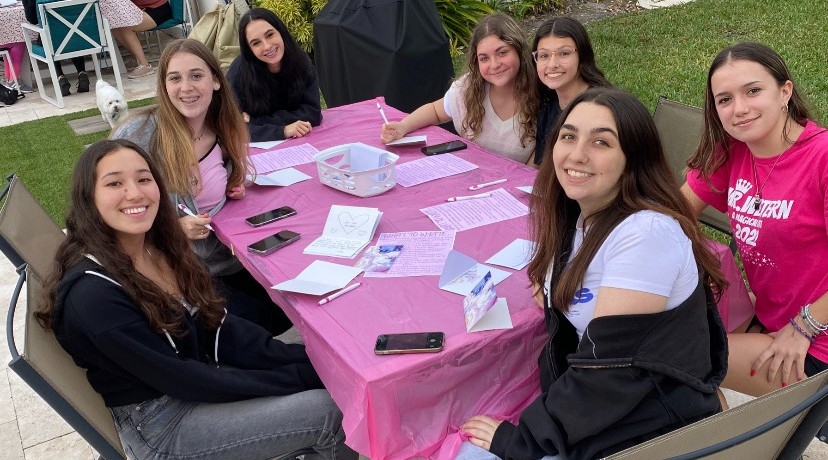Eric Berger | JTA

When Rachel Wojnilower was an undergraduate at American University in Washington, D.C., she did all kinds of activities with her Jewish sorority, Alpha Epsilon Phi. Now 36, Wojnilower has let most of them fade from memory.
But in retrospect, one in particular stands out.
That’s because about five years after graduating, Wojnilower got married and underwent genetic testing along with her husband as they both prepared for future children. They were surprised when they each tested positive as carriers of a potentially dangerous mutation, and even more so when Wojnilower learned, after additional testing, that she also carried a mutation in the BRCA2 gene.
Such mutations, which are 10 times more common among Ashkenazi Jewish men and women than among the general U.S. population, significantly elevate the risks for breast cancer and ovarian cancer, and also increase the risks for melanoma, pancreatic and prostate cancers.
Without any intervention, there was a 50-50 chance that the couple would pass down this dangerous mutation to their children. Wojnilower didn’t know what to do.
“As you can imagine, my stress and anxiety levels were through the roof,” Wojnilower recalled. “I didn’t know a single person who had ever gone through this before.”
Then she remembered one of the volunteer opportunities she had done with Alpha Epsilon Phi: a fundraising drive for Sharsheret, the national Jewish breast cancer and ovarian cancer organization.
Wojnilower reached out to Sharsheret and spoke to one of organization’s social workers, who explained more about the mutation and what measures she could take to protect her health and that of her future children. The social worker connected Wojnilower with a trained peer supporter — another young woman who had had a very similar experience.
Ultimately, Wojnilower and her husband decided to pursue pre-implantation genetic diagnosis (PGD) — a cutting-edge procedure used with in-vitro fertilization (IVF) to screen embryos. This enabled them to identify which embryos were lower-risk and thereby reduce the chances of passing on the BRCA mutation.
Wojnilower has since given birth to two healthy children, both free of the genetic mutations that she and her husband carry.
“That’s really the essence of what we do at Sharsheret, which is Hebrew for the word chain. We are connecting women, families, and communities to each other and to life-changing and, quite frankly, lifesaving resources,” said Jordana Altman, Sharsheret’s director of marketing and communications. “Whatever the issue may be, you’re not alone, and we have skilled trained professionals and a community of thousands who together form a chain of support and information.”

Sharsheret Pink Day events, like this student-run fundraiser at Binghamton University, now take place at more than 150 college campuses, Jewish day schools and companies around the world. (Courtesy of Phi Mu Chapter of Alpha Epsilon Phi at Binghamton University)
In the years since Wojnilower was a student, Sharsheret has expanded its activities on college campuses and in Jewish day schools much more widely. One centerpiece of Sharsheret’s activities on campus is Sharsheret Pink Day — an annual day in February dedicated to the cause during which students and faculty dress in pink and undertake other activities to raise awareness of the risks for breast cancer and ovarian cancer as well as Sharsheret’s critical support programs.
The goal of Pink Day is to engage young people to participate in activities that they will remember later in life so that when one of them confronts a cancer-related challenge or helps someone who is, they’ll remember the resources Sharsheret offers. This year, Sharsheret hosted Pink Day activities around the United States at college campuses, Jewish high schools and day schools.
“We are planting seeds about Sharsheret,” said Ellen Kleinhaus, Sharsheret’s regional director of education and outreach. “While today you may only need Sharsheret to better understand your risk, you or someone you love will need Sharsheret for support in the future. There isn’t a family or a community out there that is not touched by breast cancer or ovarian cancer.”
Pink Day’s origins can be traced to 2006, when a New Jersey Jewish high school organized a dedicated day for students to support Sharsheret by wearing pink and sharing resources with their parents.
“It was such a memorable part of my high school experience,” said Tzvi Solomon, one of the students who initiated Sharsheret Pink Day. “People really rallied around it.”
Solomon was so inspired by the event that when he went to Israel for his gap year, he asked peers in the United States and Israel to bring Pink Day to their schools. Now an international initiative, the program engages thousands of participants at more than 150 schools and companies globally.
“I think it’s a reflection of our community being sensitive and recognizing the importance of having an organization like Sharsheret,” said Solomon, whose young son wore a pink shirt to school on this year’s Sharsheret Pink Day.
Amanda Goldsmith, 28, has been involved with Sharsheret since her Jewish day school hosted a Pink Day. Years later, while attending New York University, Goldsmith remembered Sharsheret when her parents called her one morning to inform her that her mother had just been diagnosed with breast cancer. Goldsmith immediately turned to Sharsheret for help and information, and she referred her mother to the organization’s peer support network.
During her mother’s treatment, Goldsmith vowed that once her mother was cancer free she’d start an initiative to get college students in New York City more involved with Sharsheret. She ended up establishing a local student board for the organization in New York City.
On Sharsheret Pink Day last year, Goldsmith, a human resource professional, implemented Wear Pink at Work, where her colleagues gave a $5 donation to Sharsheret and wore pink to the office. Her family also established a new Sharsheret program for young adults called YAD: The Young Adult Corner, which helps young adults understand their loved ones’ diagnoses, provides peer support and manages a website about cancer for young adults.
“It’s really just about spreading Sharsheret’s mission because they do so much good for so many people,” said Goldsmith, whose mother is now cancer free. “Pink Day might seem like something relatively small, but it’s hugely important.”
To learn more about Sharsheret, YAD: Young ADult Caring Corner or Sharsheret Pink Day 2024, email [email protected].
This article was sponsored by and produced in partnership with Sharsheret, the national Jewish breast cancer and ovarian cancer organization. This article was produced by JTA’s native content team.







